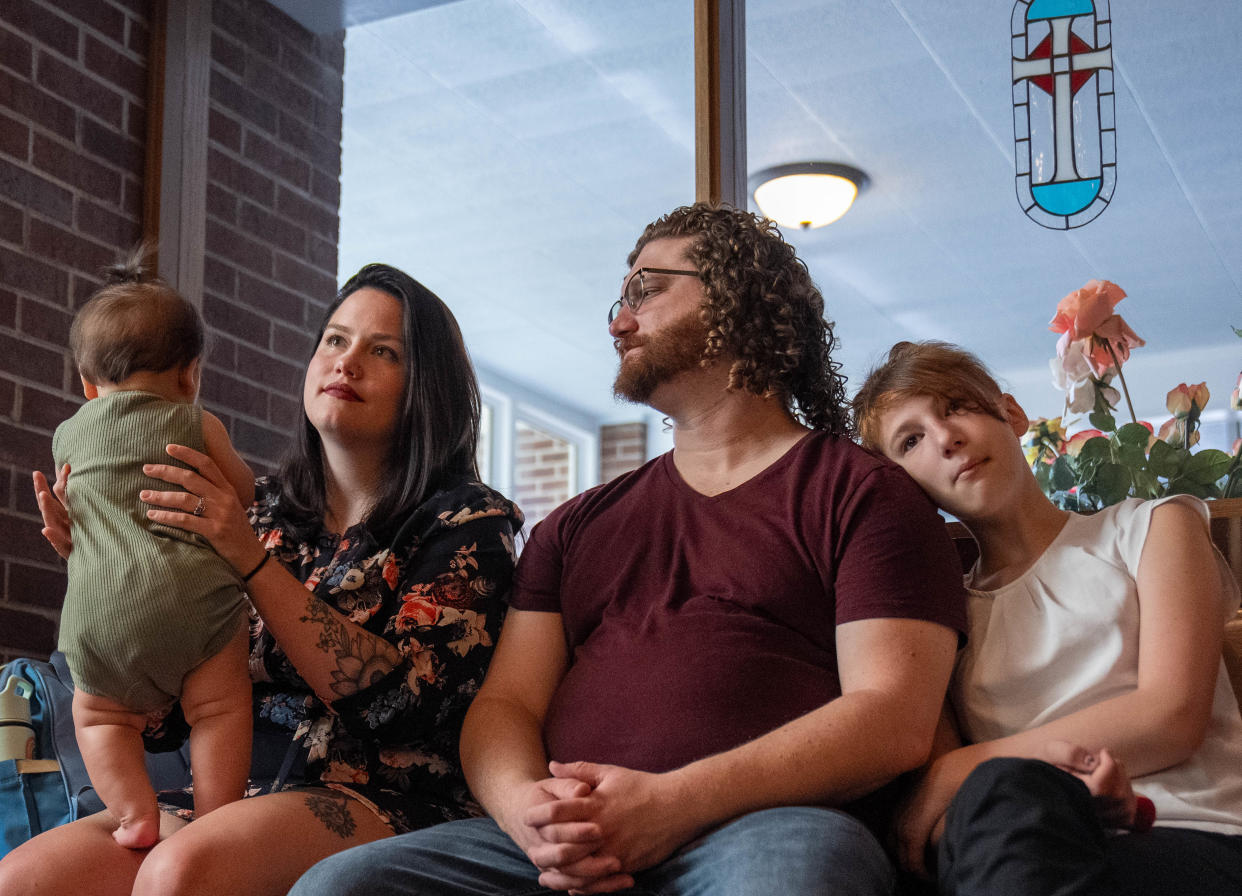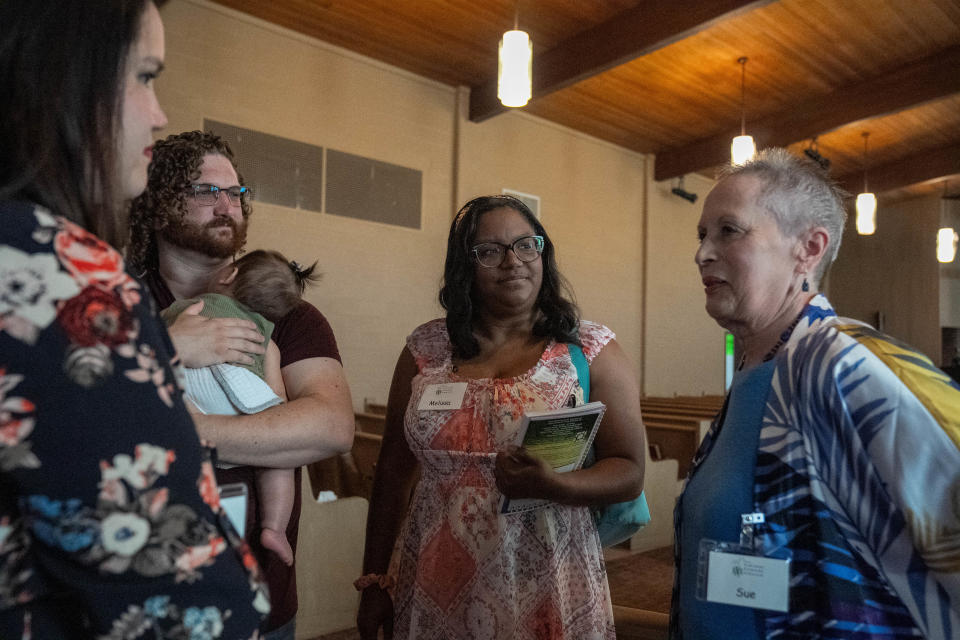'I can hold both': How some LGBTQ+ Hoosiers find community, comfort in Christian spaces

Pastor Ben Snyder’s tears began to flow midway through his sermon.
“God is love,” he read from 1 John. “We love him because he first loved us.”
Snyder, the lead pastor at Carmel Friends Church, was so moved by the verses that he choked up several times from his place at the pulpit. He scanned his congregation of about 30 other Quakers and spoke of God’s love – sprawling, everlasting, unconditional – with as much conviction as he could muster.
“God loves you,” he said. “Even when you don’t feel it, you should know it.”
Local Pride music and art: 'Prism' celebrates LGBTQ+ voices that make artistic community vibrant and inclusive
From the back of the church, Emily Allan believed him. She never took her eyes off Snyder: Not even her fussing 7-month-old daughter could tear her attention away.
Raised Catholic near Mishawaka, 28-year-old Allan understands the love of a higher power. She’s felt it every day for as long as she can remember, enamored by her faith from a young age.
As a child, she absorbed sermons and Sunday school teachings, admired the intricate church décor and committed her prayers to memory. Catholicism brought her comfort, safety and ritual, along with a close-knit community.
Three truths had revealed themselves by the time Allan was 16. The first, she always knew: God loved her. The second, she knew too: She loved her faith. The third, she came to understand later: She was gay.
The Catholic faith considers homosexuality to be a mortal sin, Allan said, though she didn’t agree. After a lengthy search for a solution – some way to marry two integral parts of her identity – she left the Catholic church at 17.
But that hasn’t stopped her from crossing herself on occasion, attending Mass on holy days or turning in times of distress to the rosary she keeps in her daughter’s diaper bag. It hasn’t stopped her from loving God and knowing he loves her.
Allan, still deeply spiritual, holds her truths in tandem – even after leaving the religious tradition she was raised in. She’s long since embraced her sexuality and continues to find comfort in the church: a sacred space for her.
“Going to church is (like) getting a hug from my mom,” Allan said. “It’s one of the most selfish things I have in my life.”
Hers is a balance many in the LGBTQ+ community have struck. Despite perceived dissonance between some conservative Christian institutions and the community, evolving practices in some denominations have not only allowed individuals to survive those spaces but thrive within them. More than 4 million LGBTQ+ American adults identify as Christians, according to UCLA's Williams Institute.
Christianity and the LGBTQ+ community: a shifting narrative
That hasn’t always been the case: The typical narratives on faith and sexuality drive a wedge between the two, with more evangelical, conservative religious groups condemning same-sex relationships as incompatible with their teachings. Some denominations of Christianity, including most Baptist and Methodist churches, have specifically prohibited same-sex unions within their congregations, ostracizing and excluding LGBTQ+ members.
Nick Brown has seen the dynamic play out over and over again.
“The story of unaccepting families and church communities and hostile faiths and self-loathing and being mistreated, it’s just like a drumbeat,” Brown said. “It’s so sticky and so hard to change.”
'I just feel powerless': Trans teens share their stories as new Indiana laws target them
Brown, 42, is a therapist at the Damien Center, Indiana’s oldest AIDS service organization. He grew up in an evangelical Methodist church, attending Sunday school as a child and weekly services into adolescence, and he received a master's in counseling from the Denver Seminary.
As a gay man raised in church, Brown knew firsthand of the often-volatile relationship between evangelical Christianity and the LGBTQ+ community. As someone educated in the faith and working through a faith journey of his own, he knew it didn’t have to be that way.
Two years ago, Brown began spearheading Indy Pride’s Interfaith Celebration, a gathering inviting members of the LGBTQ+ community to share their faith stories, to change the oft-repeated narrative. This year’s event, held at Riverside Park on June 4, saw around 20 people from multiple religions convene in a group setting – celebrating spirituality in all its forms.
“We can affirm ourselves by being present with each other,” Brown said. “I don’t know of a faith base that doesn’t seek community.”
A personal definition of faith
Sporting a rainbow jumpsuit and with her husband and children in tow, Allan spoke at the celebration of her childhood in Catholicism to an adult life in the Quaker church. Rebekah Ryan, quietly observing under the pavilion, listened.
Raised in the Missouri Synod denomination of Lutheranism, Ryan, 34, was accustomed to community. In her small Wisconsin town, the church was as much a social structure as it was a spiritual one.
With the Lutheran tradition constantly encouraged and reinforced, Ryan said she never wrestled with church principles or guidelines – even ones that excluded LGBTQ+ people. But with a more liberal understanding of Lutheranism and a wider peer network at Luther College in Decorah, Iowa, she started to grapple with everything she’d been taught growing up.
Ryan never questioned her core faith, though – not when the rules felt a little too restrictive, not when she met her first queer friends, not even when she came to terms with her own sexuality amid isolation of the pandemic. Her belief in a higher power, one that accepted her and loved her unconditionally, remained.
“I kept getting these affirmations, that I’m going to say are from God, that were just like, ‘Yes. You are whole. You can be a full, complete person,’” Ryan said. “I can hold them both with both hands.”
A new sense of community further bolstered her faith, she said. She found a network of people navigating similar dynamics with the Q Christian Fellowship, a series of online support groups for Christian members of the LGBTQ+ community, and she’s since joined the congregation at Northminster Presbyterian Church.
What’s emerged is a fluid, ever-changing understanding of faith, Ryan said, strengthened by the confidence she gained in embracing her identity as a lesbian. To regard her sexuality and her faith as separate, movable parts is an impossible task, she said.
Jesus Christ – the one she knows and regards as an example – would never ask her to do that anyway, she said. Christianity isn’t about following the rules or staying in bounds, Ryan said: It’s about loving others as Jesus did.
Sometimes, Ryan practices her faith through traditional church attendance. Other times, it manifests in her passion for activism or even just being outdoors.
“I’m still feeling God powerfully, even more so than when I was doing all the ‘right’ things,” Ryan said.
Allan, though a regular church attendee, worships in a number of other ways outside the pews. She threw herself into volunteering when she wasn’t with a congregation, emulating the spirit of Christianity with community outreach, and she talks to God even when she’s away from the church.
The Quaker faith preaches a more personal, direct relationship with God than other Christian sects, which often use priests or pastors as conduits for God’s message. Snyder, who holds a master’s degree in practical theology with a concentration in Quaker studies, said this teaching means Quaker churches are often more welcoming to members of varied backgrounds than other Christian denominations.
“We believe that the Holy Spirit is still trying to work with people,” he said. “It kind of invites this intimacy with the divine.”
Leading with love

Through Snyder and his congregation, Allen has found a new church family. Her nonbinary 10-year-old attends the youth ministry with the children of other members, and her 7-month-old recently completed her dedication ceremony.
With an accepting and affirming church to turn to, Allan knows she isn’t living in sin. The teachings in the Quaker faith place love at the forefront – something her God would never condemn.
“All I’ve ever done is love everyone,” Allan said. “Nowhere does it say, ‘Don’t love someone.’”
But queer people can’t always reach that realization, especially in a sometimes-vitriolic culture. Some convert to a faith tradition more accepting than the ones they grew up in. Others abandon faith entirely.
Allan understands why: God may love unconditionally, but she knows not everyone in religious institutions feels the same.
“Churches are made of people,” she said. “I can’t guarantee that every single person is going to be welcoming and accepting.”
These exclusionary attitudes have impacts that spread far outside houses of worship, with legislation targeting the LGBTQ+ community filed in Indiana and across the country. Both traditional divides and contemporary strife have, at times, made Allan more hesitant to say she’s a Christian than to say she’s gay.
Related: These new Indiana laws affect transgender and other LGBTQ Hoosiers
Though relations have improved between Christian communities and the LGBTQ+ community (a 2020 Pew Research Center study reported 76% of U.S. Catholics believe society should accept LGBTQ+ individuals, for example), Allan knows hate and fear still linger. She worries especially for her kids, whom she’s raising in the Quaker faith.
But the positive example Allan aims to set instead is working, she said. Her child and a friend left Indy Pride confused by the anti-LGBTQ+ protesters across the street, wondering how someone could use the Bible to justify exclusion.
“They’re both sitting there like, ‘That’s not right. That’s not who God is,’” Allan said. “They could not comprehend a world in which God hates.”
That world doesn’t exist, Allan said, because at the core of Christianity is love. It’s why she, Ryan, Brown and others at the intersection of faith communities and the LGBTQ+ community still practice.
Allan still looks to Scripture as comfort. The creation story in Genesis is one of her favorites.
“God gets to the end of it and goes, ‘It was good,’” Allan said. “He made humans, and they were good. And that’s good to remember.”
Contact Pulliam Fellow Heather Bushman at HBushman@gannett.com. Follow her on Twitter @hmb_1013.
This article originally appeared on Indianapolis Star: How some LGBTQ+ Hoosiers find community and thrive in Christian spaces

